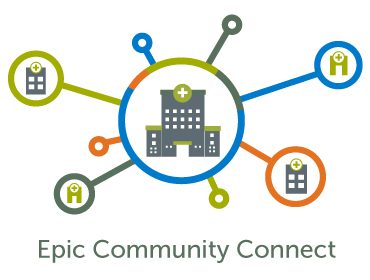
What is Epic Community Connect?
How does Epic Community Connect Work?
Many smaller hospitals and clinics are utilizing benefits of Epic Community Connect , a program that allows them to partner with a larger “host” hospital that uses Epic to leverage its benefits without all of the cost. The larger hospital essentially manages Epic and extends a version of it to the partner. This arrangement takes hosting out of the picture for the smaller organization while enhancing EHR uniformity and interoperability among local area providers – a win-win for care in the community.
More and more communities are adopting Epic Community Connect program. Leading the industry with a 29% market share, Epic is already used in many large health systems. In fact, it is estimated that more than 250 million patients have an electronic medical record in Epic. And, those records are going places. Epic reports that its users share 100 million records per month, and 63 percent of Epic customers report achievement of deep interoperability (up from 13 percent in 2017, according to a KLAS report).
Benefits of Epic Community Connect
- Simplified access to an EMR that manages a shared community of secured patient records.
- Enhanced interoperability within a national health information exchange framework of nearly 2,000 hospitals and 45,000 clinics that includes advantages such as avoiding duplicate results, sharing information, and improving communication between providers and patients.
- Technical and regulatory confidence as Epic provides a HIPAA-compliant communication system that eliminates the need for an open-source HL7 interface to share HL7 messages between systems.
- Cost savings from not taking on the burden of implementing a full-scale Epic instance on their own yet benefiting from better coordination of care, avoidance of duplicate testing/procedures and more opportunities to measure quality.
- Advanced progress toward a comprehensive patient record as data is updated and shared seamlessly among providers and the patient.
Establishing a Legacy Data Management Strategy with Epic Community Connect Implementation
With Epic as the go-forward EHR, there is an opportunity to decommission legacy servers, converting and/or archiving historical data elements. As data conversion can be costly and complex, archiving becomes a key strategy for legacy data management. While it provides cost savings and reduces risk, it can also improve continuity and quality of care by integrating with Epic through secure Single Sign-On to make historical patient data accessible when clinicians need it most.
When a hospital or clinic decides to opt into Epic Community Connect, this kicks off the need for a plan for the applications it will replace. Generally, the larger the organization, the larger the inventory of applications that will need to be addressed.
Here are three considerations around legacy data that need to be a part of the planning process:
- Conversion vs. Archival. Not all legacy data (patient, business and employee records) from a system Epic replaces gets converted to Epic due to cost and complexity, but it often still needs to be retained for compliance with record retention regulations, Cures Act and legal needs in the future.
- Continuity and Quality of Care. Access to a complete historical medical record – including legacy patient data – can be imperative to a physician’s ability to deliver the best patient care.
- Record Consolidation and Centralization. Archiving legacy data and making it available via Single Sign-On from Epic consolidates data stores, reduces out-of-production system maintenance costs, mitigates technical risk, complies with record retention mandates, and helps enable interoperability and data analytics.
For larger providers who serve as the Epic Community Connect host and also are working through their own legacy application management, Harmony Healthcare IT has some suggestions:
- As IT application portfolios are streamlined and EHRs are replaced, have a data conversion or data retention plan for the data remaining in legacy applications.
- Document a solid legacy data management archival strategy to serve as a foundation for future consolidation of historical patient, employee or business records and to help streamline the IT portfolio as acquisitions are made and/or entities are onboarded through Epic Community Connect.
HealthData Archiver®, an active archive, is designated by Epic as an Orchard app in its App Market program. Live and in use at many Epic customer sites since it was first made available in the Epic App Orchard in 2019, HealthData Archiver® is a cloud-based legacy data management solution with its Single Sign-On integration from Epic that enables patient context sharing, release of information workflows and revenue cycle features—offering a significant value for provider organizations decommissioning legacy systems.
Are you an Epic user looking for a trusted solution to help manage historical patient, employee, and business records? Or is your organization considering a move to Epic in the future and in need of a partner for data migration and/or archiving?
As an experienced vendor with an archive product listing in the Epic App Market, we can help.






